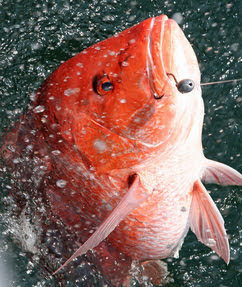
|
South Atlantic Council Takes Major Step to Conserve Red Snapper
Members of the South Atlantic Fishery Management Council (Council) are once again leading the way to conserve and manage marine fisheries in creative ways. During their September meeting in Charleston, S.C., the Council voted unanimously to require recreational and commercial fishermen fishing for snapper/grouper species to have a descending device onboard and readily available for use when fishing in federal waters. The requirement is part of regulatory Amendment 29 to the Snapper Grouper Fishery Management Plan and must be approved by the Department of Commerce before going into effect.
The recreational fishing community has long advocated for the use of descending devices to reduce the mortality rate of fish in the prized snapper/grouper complex. When deep-water fish (more than 30 feet) are brought rapidly to the surface, they experience barotrauma – a condition where a buildup of gases in their bodies makes it difficult or impossible to swim back down. If a fisherman releases the fish due to size or bag limit restrictions and the fish does not survive, this is a dead discard or wasted fish. It’s clear that no one supports wanton waste of America’s fishery resources. By following simple best fishing practices such as the use of descending devices, we can return alive many more fish to their deep-water homes.
Conserving our marine resources through good conservation measures like this one unquestionably helps grow the stock abundance. With proper monitoring and quantification, reducing discard mortality may lead to longer seasons and greater public access.
This common-sense measure enjoys widespread support from major recreational, commercial and environmental organizations which share the goal of improving survivability of released fish. The recreational fishing community urges other regional fishery management councils to implement similar conservation measures and for Members of Congress to do what they can legislatively to promote best fishing practices.